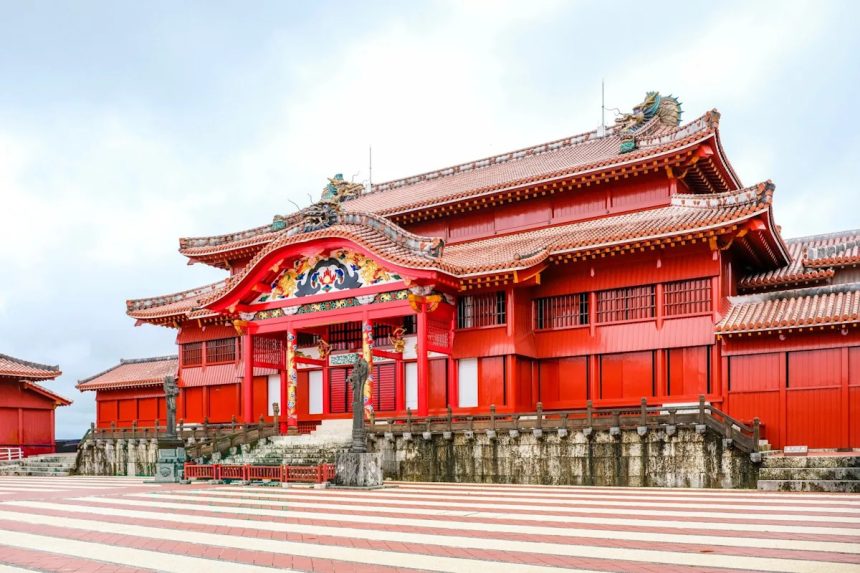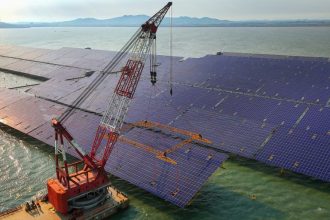There have again been calls in Chinese state media for more research into “historical justice” and legal claims around Ryukyu, as a diplomatic row over Japanese Prime Minister Sanae Takaichi’s comments on Taiwan drags on.
On Wednesday, state-run Global Times in an editorial called for further studies to be done on the Ryukyu island chain, arguing that it was an important issue that was much more than academic.
“The geopolitical position, strategic choices and future trajectory of the Ryukyu Islands not only determine their own fate but also profoundly affect the security concerns of neighbouring countries and regions,” the editorial said.
Do you have questions about the biggest topics and trends from around the world? Get the answers with SCMP Knowledge, our new platform of curated content with explainers, FAQs, analyses and infographics brought to you by our award-winning team.
Located between the islands of Kyushu and Taiwan, the Ryukyu archipelago was once controlled by the independent Ryukyu Kingdom.
The main hall of Shuri Castle in Naha, Okinawa, which once belonged to the Ryukyu Kingdom. Photo: Shutterstock alt=The main hall of Shuri Castle in Naha, Okinawa, which once belonged to the Ryukyu Kingdom. Photo: Shutterstock>
The chain includes Okinawa, home to tens of thousands of American troops – one of the largest military contingents in the world outside the United States.
Okinawa also forms part of the “first island chain” meant to restrict Chinese military access to the Pacific Ocean in the event of a conflict across the Taiwan Strait.
Before being annexed by Japan in the 1870s, the Ryukyu Kingdom paid tribute to imperial China and Satsuma, a domain in medieval Japan that is now modern-day Kagoshima prefecture in the southernmost part of Kyushu.
As tensions over Taiwan flare, there has been speculation that Beijing could try to challenge Tokyo’s control of Okinawa, whose history and proximity to Taiwan make it a focal point in China-Japan disputes including over the Diaoyu Islands, which Japan calls the Senkakus.
The significance of studying Ryukyu was more pronounced in light of geopolitical change across the region, according to Global Times.
“The value of this field of study is by no means confined to the level of academic gap-filling or disciplinary expansion,” it said, adding that it was “about the enduring maintenance of regional peace, the upholding of historical justice and the construction of China’s discourse system within a complex geopolitical landscape”.
The editorial suggested that studying the history around the Ryukyu Islands could help shed light on how to address “pressing real-world concerns” like America’s military presence in Japan.
Sino-Japanese ties have nosedived since Takaichi on November 7 told parliament that Japan could deploy its military forces in the event of a conflict in the Taiwan Strait.
Beijing slammed her comment as meddling in China’s internal affairs and asked the Japanese leader to retract her statement, which she has yet to do.
Takaichi’s comment marked a departure from Tokyo’s strategic ambiguity on how Japan could react in a conflict over Taiwan.
The Japanese government has insisted Takaichi’s remarks were hypothetical and that its position regarding the self-ruled island had not changed from what was stated in the Japan-China Joint Communique of 1972, which normalised ties between Tokyo and Beijing.
Beijing sees Taiwan as part of China to be reunited by force if necessary. Most countries, including the United States and Japan, do not recognise Taiwan as an independent state, but Washington is opposed to any attempt to take the self-governed island by force and is committed to supplying it with weapons.
In recent days, some Chinese official media have linked Takaichi’s remarks to Japan’s invasion of China in WWII, accusing her of seeking a revival of Japanese militarisation.
Beijing has argued that the 1951 San Francisco Peace Treaty, which put the Ryukyu Islands under America’s temporary administration, is invalid.
Citing the 1943 Cairo Declaration and 1945 Potsdam Declaration, the two documents that outlined the terms of Japan’s surrender in the WW2, some Chinese historians argue that Japan’s territory is limited to four major islands – Honshu, Hokkaido, Shikoku and Kyushu – and that the status of Ryukyu is undetermined.
On Tuesday, Changanjie Zhishi, a social media account run by the official Beijing Daily, cited the controversy surrounding Takaichi’s comment that “publicly linked the Taiwan Strait situation to Japan’s survival, stating that ‘a Taiwan contingency is a Japan contingency'”.
“It is therefore time to address the Ryukyu issue and help Japan settle its ‘old accounts’,” it said in a post.

Okinawans protest in Naha in July last year over a spate of cases involving US military personnel accused of committing sexual crimes. Photo: Kyodo alt=Okinawans protest in Naha in July last year over a spate of cases involving US military personnel accused of committing sexual crimes. Photo: Kyodo>
The post referred to an October 9 speech by China’s deputy permanent representative to the United Nations, Sun Lei, who urged Japan to “stop prejudice and discrimination against Okinawans and other indigenous peoples”.
Sun delivered the speech during a meeting at the United Nations General Assembly, and it caused unease in Japan that Beijing might challenge Okinawa’s sovereignty in the future.
The Changanjie Zhishi post also highlighted the 1945 Battle of Okinawa, when a large number of Okinawan people died because of starvation or suicide.
The 1945 battle was one of the bloodiest in the Pacific theatre of World War II. According to figures from the Okinawan government, some 242,000 people were killed – civilian and military, Japanese and foreign.
After the US ended its administration of Ryukyu in 1972 under the Okinawa Reversion Agreement, the island became home to a heavy American military presence.
The US presence has been controversial and prompted protests among local Okinawans over the decades. Many have voiced concerns about noise pollution, security and the safety of local women amid complaints of sexual violence by American soldiers.
The Changanjie Zhishi post stated that “before meddling in the internal affairs of other nations, Japan ought first to settle its own historical debts and address the Ryukyu issue with complete transparency”.
“Faced with this historical ‘ulcer’ alone, Japan lacks both the qualification and the standing to speak with such audacity, let alone treat Taiwan as ‘its own affair’,” it added.
This article originally appeared in the South China Morning Post (SCMP), the most authoritative voice reporting on China and Asia for more than a century. For more SCMP stories, please explore the SCMP app or visit the SCMP’s Facebook and Twitter pages. Copyright © 2025 South China Morning Post Publishers Ltd. All rights reserved.
Copyright (c) 2025. South China Morning Post Publishers Ltd. All rights reserved.









